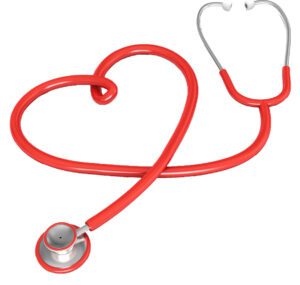
There are many contributing risk factors including diet, family history, physical activity, and smoking. It’s important to remember that stress is also a crucial component that can jeopardize a healthy heart.
Nurses encounter countless psychosocial risk factors that can lead to occupational stress – a type of stress that is work-related and affects many professionals daily.
Since February is American Heart Month – a national awareness month dedicated to increasing the knowledge of heart disease and its risk factors – we asked nurses from various settings to share their favorite ways to stay heart healthy and reduce stress:
“I use apps like ‘Headspace’ and ‘Calm’ for quick-guided meditation! And yoga is also always good when you have time.” – Victoria B., RN
“When I feel stressed, I make a list of my worries and put the date they need to be taken care of next to them. I put the list somewhere I can clearly see. It makes me feel lighter and like I’m not going to forget anything.” – Yara S., RN
“I am a huge meditator! Meditation is the single most effective method of stress reduction that I have ever used.” – Christa D., RN
“I love to read a good book. It relaxes my mind.” –Vilja R., RN
“I like to meditate. Meditation for me is anything that I can get so absorbed in that my stressors become distant. I love to play the piano & I’ll play a classical music song so I can just focus on the notes. It’s a way of being mindful & if you are so involved in the moment—how your fingers feel on the cold ivory keys, the clarity of every note, the vibration of the pedal as you blend the sounds together, & the melody as it flows from the paper to your mind & out of your fingers—then the stress seems less available to focus on & you relax.” –Dr. Stefani M., DNP ACAG-BC
“I enjoy coloring in a coloring book while listening to music.” – Ayhesha P., MSN, RN-CNL
“I like to work out.” – Cyniah M., MSN, RN-CNL
“The thing that helps me de-stress and unwind the most is getting on the floor and playing with my dog when I get home from work at night. – Brittany R., RN
Your mental health impacts your physical health and stress management is vital for lowering your risk for heart disease. Inform yourself, take care of yourself, and spread your knowledge to others.
Know the Symptoms:
The primary heart attack symptom for both men and women is chest pain. However, women also often experience different, atypical symptoms WITHOUT the usual chest pain, resulting in the delay of early intervention and treatment. These symptoms include:
- Palpitations (irregular heartbeat)
- Pain in the back, jaw or shoulder
- Anxiety, sweating, indigestion
- Some women may ONLY experience shortness of breath, nausea, vomiting or flu-like symptoms
Focus on Prevention:
The majority of a person’s heart risk is modifiable if people know the symptoms and are taking the appropriate steps to prevent heart disease. By following these steps outlined by the AHA, you can reduce your risk.
- Don’t smoke
- Manage your blood sugar
- Monitor your blood pressure
- Lower your cholesterol
- Know your family history
- Stay active
- Maintain a healthy weight
- Eat a balanced diet
- Be mindful of your stress level
For more information about heart disease and women, visit www.goredforwomen.org.
What are some ways that you de-stress? Please share them with us below!
This blog post was written by Marquina Watts, MSN, who was a Nurse Resident at Independence Plus.
